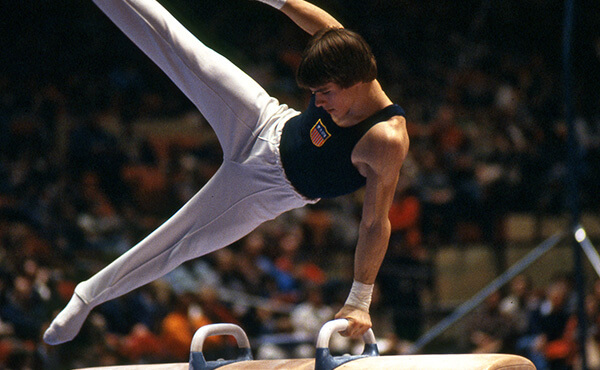Kurt Thomas Leaves ‘Road Map’ For Those Affected by COVID-19 Olympic Postponement

When the United States boycotted the 1980 Summer Olympics, the “What ifs” began — and they haven’t stopped even four decades later. But it is not just swimming that was affected. U.S. gymnast Kurt Thomas was one of the most affected — perhaps the most.
Thomas died on June 5 at the age of 64 and has been mourned by Olympians around the world, including in the swimming community. In fact, Olympic gold medal swimmer John Naber said that it was the way Thomas handled the disappointment of the boycott that should echo with athletes who have been affected by the postponement of the 2020 games because of the COVID-19 pandemic.
“There is no Olympian that suffered the boycott more than Kurt Thomas. He had a royal flush in his hand and he wanted to play it. He had the look, the chops, the charisma. He was primed to be an Olympic superstar. When he was denied that opportunity, I never met a man who seemed less inclined to pity himself or be resentful. He just seemed to shrug it off,” John Naber told Swimming World. “He epitomized being an Olympian. It was a painful shock to hear he died. For those who missed the Olympics this year, he might be a road map for how everyone should behave about it.”
Naber won four gold medals at the 1976 Olympics. He first met Thomas leading up to the 1980 games. He then worked with Thomas as a broadcaster after his swimming career.
“There were an awful lot of pre-Olympic functions and we got to know each other a little bit. (Later) We worked as a broadcast team on a couple of occasions where I did the play-by-play and he did the commentary,” Naber said.
Thomas suffered a stroke on May 24, according to USA Gymnastics.
He was the first American man to win a world championship in gymnastics and his scissor-kick on the pommel horse — the “Thomas Flair” — became a staple in the sport.
“Any time I see a gymnast do the ‘Thomas Flair,’ I think of his impact,” Naber said.
Thomas even tried to make a comeback at 1992 at age 36 and competed at the Olympic trials, but did not make the team.
He remains perhaps the biggest “What if” athlete of the 1980 boycott. But the fact that he handled it with class is his biggest impact.
“The way Kurt Thomas behaved about it, we can all take solace in that,” Naber said. “I love being a part of the Olympic family. To see members passing on might be a good reminder to appreciate them before they are gone. We need to make the time for the people who had that kind of impact and say thank you before it is too late.”
Naber knows a thing or more about excelling at the Olympic Games, as he took home five medals from the 1976 Olympics in Montreal, including four gold. Naber won both backstroke crowns during that Olympiad, and was the silver medalist to American teammate Bruce Furniss in the 200 freestyle. That 1976 squad is widely considered the greatest Olympic team ever put together.



